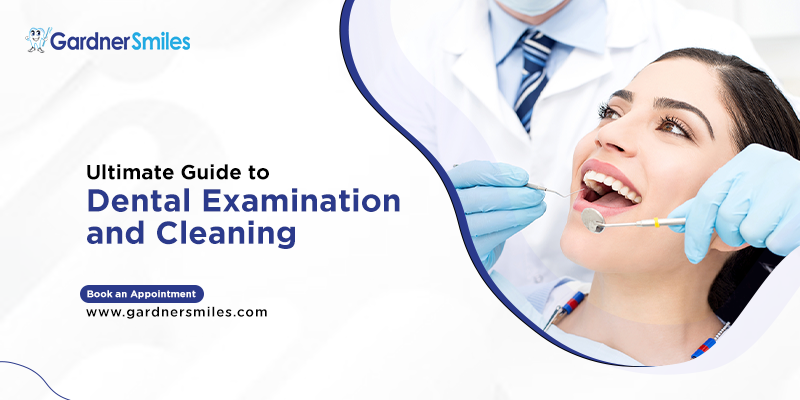Let’s start things off with a mini-game. What is the odd one out? Going to the gym regularly, eating regularly, attending work or school regularly, and visiting the dentist for a regular dental examination.
Most likely, visiting a dentist will be the odd one since people often ignore their oral health. It further results in oral complications that may or may not be severe, like tooth decay or oral cancer.
The best way to prevent oral health from constantly degrading is to have a regular dental examination and dental cleaning, as most of these problems are identifiable at an early stage and should preferably be treated while they are at an early stage of expense.
In case you have the slightest doubt about the dental examination, don’t worry. Reading this entire blog is all you need to have clarity.
What is a Dental Examination?
A dental examination can either be a specific check-up for your ongoing dental problem or a regular dental check-up of your oral health, including scanning for tooth decay, gum disease, cavities, oral cancer, and other dental conditions. Some dentists even emphasize getting dental x-rays to analyze inconspicuous areas to the naked eye.
The significant difference between a problem-based and a routine check-up is that the area of examination in the former case is limited to the problematic zone. In contrast, in the latter case, everything is thoroughly analyzed.
The Purpose of Dental Examination
For you, a dental check-up may be a specific oral problem or a regular check-up to rest assured about your oral health. The dentist, though, will conduct a deep analysis of your gums, teeth, and underlying areas to determine the possibility and symptoms of oral complications if any.
If all goes well, you will be given a green signal until your next regular test, also known as the “recall” examination. Recall dental exams aim to analyze changes in your oral health since the last dental check-up. Undertaking this procedure in periodic intervals will allow your dentist to develop a baseline or graph of your oral health.
The examiner or dentist will also advise changes in your habits or routine based on the results of your dental check-up.
How often should you have a Dental Examination?
The answer varies from patient to patient, depending upon their oral conditions. Your dentist will consider your medical history and results derived from recent oral examinations to give you a tentative frequency of visits.
Dentists generally call for a revisit after six months or a year for people with good oral health and no signs of future complications. Whereas those suffering from any oral condition or are showing symptoms of future complications are called more frequently depending upon their oral health.
Whatever the condition, our dentist ensures that proper diagnosis and treatment, and tips to protect and maintain oral health are provided every visit. This helps the patients maintain good oral hygiene or start treating any future complications to prevent possible dental surgeries, ultimately saving their health and money.
What to Expect During Dental Examination and Cleaning?
Along with your dental examination, your dentist might recommend a regular dental cleaning to prevent the development or severity of any dental infection or disease. It is also recommended to maintain or improve the current condition of your oral health and hygiene.
However, dental check-up and cleaning are proper dental procedures involving a checklist. Let us take you through things you can expect in a dental exam and cleaning.
Analyzing your Medical History
The question-answer round is what you might have to go through at the beginning or middle of your examination. The dentist will question your general medical history, previous dental surgery or treatment, allergies, ongoing medications, and smoking or alcohol intake to understand a bit about your habits and overall health.
Further, he might ask about your anesthesia experience to begin with the outline of a surgical plan whenever necessary.
Examining your Teeth, Gums, and Jaw
The next step of your dental check-up is a detailed examination of teeth, jaw, gum, and all the supporting structures. A thorough investigation will be undertaken with the help of a dental x-ray, a procedure that is only sometimes repeated in every assessment.
X-ray allows dentists to analyze all the underlying problems that are not visible to the bare eye. High exposure to radiation during x-rays is a significant concern for many patients. Generally, radiation exposure is low. However, if you wish, you can clarify this with the dentist or examiner for your mental satisfaction.
Regular dental check-ups provide an opportunity for your dentist to assess the health of your teeth and gums, and to identify any potential issues early on. Failure to attend regular checkups and neglecting oral hygiene can lead to untreated gum disease, which can cause a range of complications such as chronic bad breath, gum recession, tooth loss, abscesses, and even systemic health problems like heart disease and diabetes. Therefore, it is essential to prioritize oral health and attend regular checkups to prevent the complications of untreated gum disease.
Teeth Cleaning
Don’t confuse dental cleaning with your regular routine, i.e., brushing, tongue cleaning, etc. Even though these steps are part of maintaining your oral hygiene, professional dental cleaning is more than that.

According to your oral health, you may fall under any of the three teeth cleaning categories (Preventive cleaning, deep dental cleaning, and periodic maintenance cleaning), or there are chances you might have to experience all of them in your lifetime. Well, it’s for your oral benefit.
Now, the question is, what exactly does a dentist clean?
Well, it is usually a clean-up of tartar or plaque that surrounds your gum, spaces between teeth, or on any restoration to avoid the build-up of oral infection and stains or to stop surrounding structures from weakening.
Dentists generally recommend or undertake deep dental cleaning when a patient suffers from any periodontal disease. Your hygienist will utilize medical tools such as an ultrasonic handpiece and a dental scaler to eliminate the soft and solid build-up, followed by teeth polishing. If required, adjunctive treatments like fluoride therapy will be undertaken after the completion of the overall cleaning.
Oral Cancer Exam
With the constant increase in the number of people who have oral cancer, dentists have decided to conduct oral cancer examinations as a part of dental check-ups. The diagnosis of oral cancer is often delayed; as a result, it becomes fatal.
Therefore, it is a severe problem requiring diligent action. With periodic check-ups, the chances of early identification of oral cancer symptoms or stage increases, which ultimately improves the chances of effective treatment.
This examination includes a physical test followed by a biopsy of the dubious area to determine the presence of cancerous cells. Unfortunately, if the test comes positive, an endoscopy along with an X-ray, MRI, PET scan, and other necessary imaging tests are performed to understand the severity of cancer.
How Long does a Dental Exam Take?
While the average time for a dental exam stands at 45 minutes, the actual time differs for every patient, depending on their oral health. Apart from oral health, the exam length also depends upon the question, query, or advice session, exam findings, cleaning if necessary, and the frequency of the exam.
Please remember it is best to reach for your appointment 10-15 minutes before to complete all the administrative formalities before the appointment begins.
Post-examination and Cleaning Aftercare
Taking care of your teeth and gums after a dental exam and cleaning is essential for a quick recovery. However, specific care and advice may vary from case to case; articulated below are general tips that you should consider as a part of your aftercare routine.
Avoid Eating with a Numb Mouth
Anesthesia used in dental check up and cleaning can leave you with a numb mouth, and it’s best to avoid eating until every part of your mouth comes back to life, i.e., until you start feeling everything.
Dentists recommend that you refrain from chewing or biting while your mouth is still numb to avoid disrupting the healing process.
Food Intake
Your teeth and gums will be sensitive for a while after the dental exam and cleaning. You should stick to soft and easy-to-chew food for at least 24 to 48 hours until the sensitivity disappears.
Also, it’s best to avoid challenging, hot, and crunchy foods or snacks for a few days, as they can irritate the gums and slow the healing process.
Hygiene Routine
You will be recommended to maintain or improve your regular dental cleaning routine, which involves using a soft bristle brush to clean teeth after meals gently. It’s also advisable to brush twice daily while you can still skip flossing for the initial 24 hours.
You can also rinse your mouth using salt water to reduce the risk of infection and keep the area clean.
Consult your Dentist
Experiencing sensitivity is normal after a dental exam and cleaning. However, if it lasts longer than two days, contact your dentist immediately to identify any complications or infections requiring proper treatment.
You can also contact your dentist in case of any queries or doubts to ensure a quick and perfect recovery.
Schedule your Dental Examination
Don’t make the mistake of avoiding oral health; even normal pain, in some cases, can be an underlying cause of a more severe situation. Therefore, book your dental examination appointment with Gardner Smiles for a thorough check-up and helpful advice.





